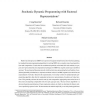Free Online Productivity Tools
i2Speak
i2Symbol
i2OCR
iTex2Img
iWeb2Print
iWeb2Shot
i2Type
iPdf2Split
iPdf2Merge
i2Bopomofo
i2Arabic
i2Style
i2Image
i2PDF
iLatex2Rtf
Sci2ools
110
click to vote
AI
2000
Springer
2000
Springer
Stochastic dynamic programming with factored representations
Markov decisionprocesses(MDPs) haveproven to be popular models for decision-theoretic planning, but standard dynamic programming algorithms for solving MDPs rely on explicit, state-based specifications and computations. To alleviate the combinatorial problems associated with such methods, we propose new representational and computational techniques for MDPs that exploit certain types of problem structure. We use dynamic Bayesian networks (with decision trees representing the local families of conditional probability distributions) to represent stochastic actions in an MDP, together with a decision-tree representation of rewards. Based on this representation, we develop versions of standard dynamic programming algorithms that directly manipulate decision-tree representations of policies and value functions. This generally obviates the need for state-by-state computation, aggregating states at the leaves of these trees and requiring computations only for each aggregate state. The key to...
AI 2000 | Artificial Intelligence | Decision-tree Representations | Dynamic Programming | Dynamic Programming Algorithms |
Related Content
| Added | 17 Dec 2010 |
| Updated | 17 Dec 2010 |
| Type | Journal |
| Year | 2000 |
| Where | AI |
| Authors | Craig Boutilier, Richard Dearden, Moisés Goldszmidt |
Comments (0)

